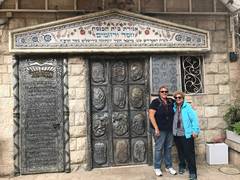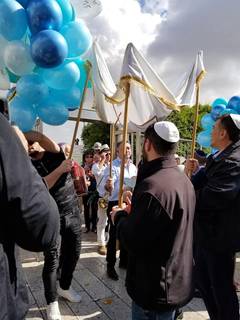Some Reflections on Pluralism in Israel
11/30/2018 09:22:32 AM
Seth Leventhal
| Author | |
| Date Added | |
| Automatically create summary | |
| Summary |
While the impression you may get from the media is that Israeli politics and religion is dominated by the Ultra-Orthodox, one thing we learned during our travels is that Israeli society is becoming increasingly pluralistic. This was quite apparent soon after our arrival when I took a stroll along the boardwalk on the beach in Tel Aviv. It seemed that just about every person we walked by came from a different ethnic or religious background and spoke a different language! This may not be surprising in Tel Aviv, known as the ‘secular’ center of Israel, but we continued to learn more about pluralism in Israel when we arrived in Jerusalem.
The first night in Jerusalem was Shabbat (we had to race to get there before sundown, as our assistant guide’s wife had warned him that he was going to have to walk home if we arrived after Shabbat had begun and she could not drive to the hotel to pick him up!). Along with several of our group, I joined Rabbi Amy in attending the egalitarian Kabbalat Shabbat services at Shira Hadasha (Hebrew for ‘new song), a congregation founded in 2002 by a group of local residents, including Tova Hartman, one of Israel’s pioneers in Jewish feminism. Shira Hadasha combines a traditional Orthodox liturgy with prayer leadership opportunities for women.
At our service, both a man and woman joined in leading the prayer, and while women and men attending the service are seated separately, in accordance with Orthodox practice, they are in equal sections, with only a sheer curtain serving as a ‘mechitza’, or partition, between the sexes. In Orthodox Judaism this has been the cause of some controversy, and has been spoken out against by some, but it appears to be gaining a growing following – our service was well attended by people of all generations (including a nice group of American students in Jerusalem for the year, one of whom helped me find my place in the siddur!). According to Wikipedia, now about 20 Orthodox congregations in Israel, the U.S. and other countries have adopted Shira Hadasha’s format.
During our travels in Jerusalem, we met with people who spoke to us about topics  involving pluralism and human rights in Israel. Rabbi Noa Sattath, director of the Israeli Religious Action Center (IRAC), the Reform movement’s social action center, talked to us about IRAC’s efforts to “make Judaism accessible to Jews”, specifically, to make it easier for Reform Jews to practice Judaism in Israel. Government funding is one aspect: The good news is that the Israeli government now does provide financial support for Reform Judaism, but the bad news is they spend $800M (US dollars) on Orthodox vs. $20M on Reform. There are various legal obstacles as well. As an example, she cited the basic institutions of marriage (and divorce), where the ‘Orthodox monopoly’ on lawmaking means that marriage by a Reform rabbi is not recognized legally. Many Reform and secular Jews in Israel travel to Cyprus to be legally married. Divorce also must be through an Orthodox religious court where women cannot testify. She discussed the growth of gender segregation in the public sphere as well including on bus lines, playgrounds, libraries and health clinics.
involving pluralism and human rights in Israel. Rabbi Noa Sattath, director of the Israeli Religious Action Center (IRAC), the Reform movement’s social action center, talked to us about IRAC’s efforts to “make Judaism accessible to Jews”, specifically, to make it easier for Reform Jews to practice Judaism in Israel. Government funding is one aspect: The good news is that the Israeli government now does provide financial support for Reform Judaism, but the bad news is they spend $800M (US dollars) on Orthodox vs. $20M on Reform. There are various legal obstacles as well. As an example, she cited the basic institutions of marriage (and divorce), where the ‘Orthodox monopoly’ on lawmaking means that marriage by a Reform rabbi is not recognized legally. Many Reform and secular Jews in Israel travel to Cyprus to be legally married. Divorce also must be through an Orthodox religious court where women cannot testify. She discussed the growth of gender segregation in the public sphere as well including on bus lines, playgrounds, libraries and health clinics.
Why the ‘Orthodox monopoly’ when the Ultra-Orthodox are a minority? Rabbi Sattath explained that in the parliamentary system, it is difficult to put together a majority coalition, and the Ultra-Orthodox bloc has been adept at aligning with whichever party will guarantee their interests. But progress has been made. Rabbi Sattath mentioned that IRAC had recently won a court battle deeming that separation is discrimination and many Orthodox women have signed on to support their efforts.
 We also spoke with Rabbi Levi Kelman, President of Rabbis for Human Rights, Israel’s only multi-denominational rabbinical organization. They work to make sure people of multiple ethnicities and religions in Israel have access to the human rights due to them. One of the human rights issues they are involved in at this time of year (which is olive harvest season) is the issue of access to olive groves for Palestinian residents in the West Bank. Olive growers often find themselves blocked from access to their groves by Israeli settlements, citing security concerns. It can be very sensitive politically to get these parties to work together to reach a mutually satisfactory solution, as his organization’s efforts receive pushback both from the settlers as well as from the Palestinian Authority, who does not want to be seen as ‘collaborating’ with any Jewish organization. They have had some recent successes: The Israeli Army is now required to train soldiers on human rights, and Rabbis for Human Rights has provided this training.
We also spoke with Rabbi Levi Kelman, President of Rabbis for Human Rights, Israel’s only multi-denominational rabbinical organization. They work to make sure people of multiple ethnicities and religions in Israel have access to the human rights due to them. One of the human rights issues they are involved in at this time of year (which is olive harvest season) is the issue of access to olive groves for Palestinian residents in the West Bank. Olive growers often find themselves blocked from access to their groves by Israeli settlements, citing security concerns. It can be very sensitive politically to get these parties to work together to reach a mutually satisfactory solution, as his organization’s efforts receive pushback both from the settlers as well as from the Palestinian Authority, who does not want to be seen as ‘collaborating’ with any Jewish organization. They have had some recent successes: The Israeli Army is now required to train soldiers on human rights, and Rabbis for Human Rights has provided this training.
More blog entries to come! Do you want to see our photo albums from Israel? Log in to your account and click here.
Mon, November 3 2025
12 Cheshvan 5786
Join us for Shabbat Services
We welcome anyone looking for a place to worship to join us for Erev Shabbat services. For security purposes, all guests must submit a Visitor Form prior to attending.
Upcoming Events
This week's Torah portion is Parashat Vayeira
| Shabbat, Nov 8 |
Erev Hanukkah
| Sunday, Dec 14 |
Visit Our Facebook Page
The BCRC Blog
Sukkot 5786 at BCRC
Sunday, Oct 12 7:39amPresident's High Holy Day Speech 5786/2025
Thursday, Oct 2 10:00am

